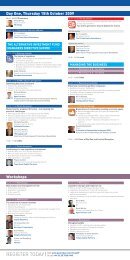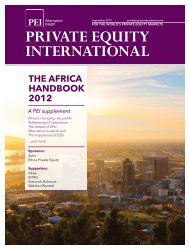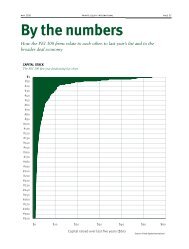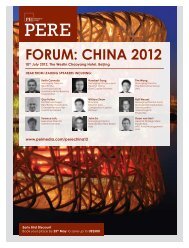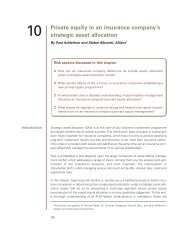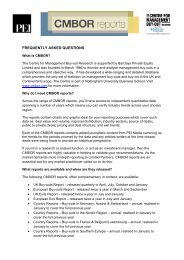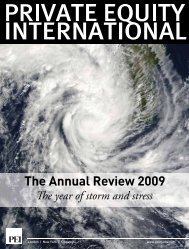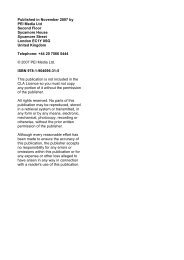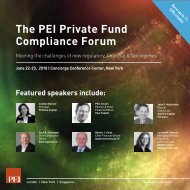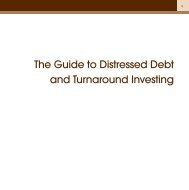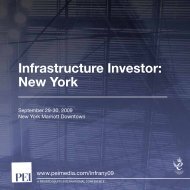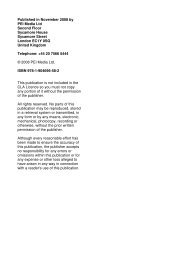THE ANNUAL REVIEW 2010 - PEI Media
THE ANNUAL REVIEW 2010 - PEI Media
THE ANNUAL REVIEW 2010 - PEI Media
You also want an ePaper? Increase the reach of your titles
YUMPU automatically turns print PDFs into web optimized ePapers that Google loves.
page 120 private equity annual review <strong>2010</strong><br />
groups and their investment portfolios very<br />
hard indeed.<br />
With that in mind, it is not surprising<br />
that of those LPs we interviewed who<br />
have invested with some of the pioneering<br />
groups, not many were able or willing to<br />
issue a positive score card. Only a couple<br />
said performance to date had been “as<br />
expected”. Others said it was too early<br />
to tell what these early investments would<br />
be able to deliver. And one London-based<br />
investment advisor, commenting on the<br />
performance of MENA funds he has<br />
backed so far, said: “We are in hope rather<br />
than expectation. There are people who<br />
say they could achieve returns above 15<br />
percent, but there are others who say the<br />
IRR will be lower.”<br />
creative destruction…<br />
Needless to say that for any MENA managers<br />
failing to engineer a satisfactory result<br />
from their existing portfolio it will be<br />
extraordinarily difficult to persuade existing<br />
investors to make fresh capital available<br />
for a new round of deal-making – let alone<br />
expand their investor base and find new<br />
limited partners going forward. Instead,<br />
the word doing the rounds in investor circles<br />
is that of consolidation and a significant<br />
manager shakeout. LPs, in other words, are<br />
expecting the make-up of the MENA GP<br />
community to change dramatically in the<br />
coming years.<br />
What is most interesting about<br />
investors’ opinions about this weeding<br />
out of unsuccessful managers is that it<br />
is widely seen as a much-needed and<br />
overwhelmingly positive development,<br />
one that will allow MENA private equity<br />
to start over and make a fresh attempt<br />
at creating an institutionally viable<br />
private equity industry in the region.<br />
According to many LPs in our sample,<br />
the resetting of MENA private equity<br />
is happening right now, affording the<br />
region an opportunity to emerge with<br />
a stronger, revitalised and ultimately<br />
more appealing GP community than<br />
before. Everything else being equal, and<br />
amid reduced competition for assets, this<br />
“We are starting to see<br />
managers that have the<br />
right characteristics”<br />
community should be expected to present<br />
an altogether more attractive investment<br />
opportunity to the institutional buy-side<br />
than the preceding generation.<br />
Josh Lerner, Jacob H Schiff Professor<br />
of investment banking at Harvard Business<br />
School and a regular visitor to the region,<br />
describes the positive significance of the<br />
moment thus: “There’s been a sort of<br />
cleansing effect from the latest financial<br />
crisis, where a lot of the groups that didn’t<br />
really know what they were doing were<br />
purged from the system, which means the<br />
groups that did survive – the successful<br />
groups – will have a lot less competition<br />
and presumably are in a position to do<br />
better as a result.”<br />
Many of the investment professionals<br />
we interviewed made similar comments.<br />
Here is how an international fund of funds<br />
manager put it: “One of the challenges<br />
we have faced has been trying to foot the<br />
rhetoric and the reality coming out of<br />
the region, speaking specifically perhaps<br />
about a number of the Dubai-based<br />
managers where there was a great deal<br />
of excitement and talk and I think perhaps<br />
unbridled optimism from a number of<br />
new managers established in the 2006-<br />
2007 time frame. What the crisis has<br />
done is, it has allowed everybody to<br />
look with the light of day at what really<br />
has remained, which is a smaller group<br />
of well-established managers that are<br />
likely to continue to be the foundation<br />
of the development of the private equity<br />
industry here.”<br />
… and a new dawn<br />
Now that the debris has surfaced and is<br />
being swept away, limited partners with<br />
faith in the notion that MENA has the<br />
potential to add value to a diversified portfolio<br />
may soon have an opportunity to (re-)<br />
visit the survivors of the recent storm, and<br />
also to take an exploratory look at new<br />
fund managers.<br />
A Tokyo-based investor, who has<br />
no prior experience of investing in<br />
the region, said: “Now would be good<br />
timing to start investing because of the<br />
shakeout. We are still watching carefully<br />
with interest.“<br />
And another fund of funds noted: “We<br />
are starting to see managers that have the<br />
right characteristics. The macroeconomic<br />
climate is also interesting, but for us,<br />
the managers are the most important.<br />
Whether we invest in MENA will come<br />
down to the credibility of the managers.”<br />
An important role in the rebuilding<br />
of the industry across the region will<br />
of course fall to those firms that have<br />
come through the past two years with<br />
their business models, reputations and<br />
investment teams intact. We asked<br />
limited partners to name the MENA<br />
private equity fund managers that they<br />
considered to be among the market<br />
leaders at the moment. Those who<br />
answered the question most frequently<br />
cited Abraaj Capital, Actera Group, The<br />
Carlyle Group, Citadel Capital, EFG<br />
Hermes, Foursan, Gulf Capital, Tuninvest<br />
and Turkven as among the groups they<br />
expected to remain active and relevant<br />
going forward.<br />
If the majority view of the investors<br />
we surveyed is correct and the post-crisis<br />
consolidation will pave the ground for<br />
a smaller but revitalised and ultimately<br />
more prosperous private equity industry<br />
to emerge, then the time for serious due<br />
diligence on existing and new managers<br />
to commence is not far away. n



